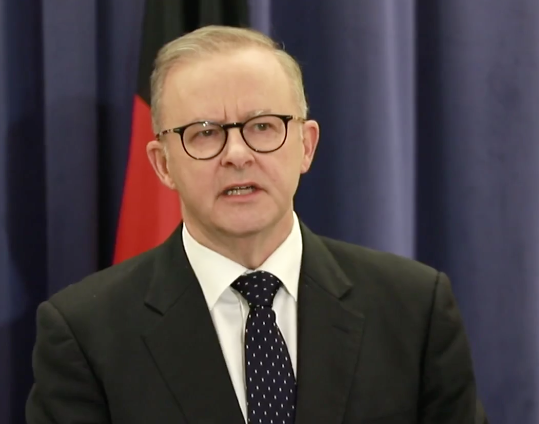ANTHONY Albanese on Sunday (October 9) insisted the government’s intention to deliver the Stage 3 tax cuts has not changed, while he reinforced the expectation of deep spending cuts in this month’s budget to attack “waste”.

Meanwhile the government on Monday will point to at least 28 major defence projects that are running a total of more than 97 years late, as it highlights pressures it faces on the budget. It says project management must be improved.
After a week of speculation that the Stage 3 cuts could be recalibrated, and then suggestions on Sunday there would be no change, Albanese said repeatedly at a news conference in Perth, “Our position hasn’t changed”.
He denied any conflict with the Treasurer, Jim Chalmers, who has been pushing for modification of the tax cuts, which are legislated to start mid-2024. In the election campaign Labor committed to keeping them. The tax cuts favour higher income earners, and Labor strongly criticised them when in opposition.
Albanese said the government was going through the budget “line by line, making sure that we get rid of the waste.
“Labor will always present responsible budgets,” he said.
Defence is one of the areas Chalmers regularly names when talking about the spending pressures on the budget. The others are aged care, health, the NDIS and interest payments on the debt.
Some 18 projects are running over budget, and there are at least $6.5 billion of variations from approved estimates. A large share of this is due to exchange rates and price indexation, the government says, but “they still have a real impact on the defence budget”.
The Coalition’s March budget estimated defence spending as a proportion of GDP would increase from 2% in 2021-22 to 2.2% over the decade, reaching more than $80 billion annually by 2032. The government says this doesn’t include future requirements not funded by the Coalition, including AUKUS and an increase in the force size.
Projects running behind schedule include: Hunter Class Frigates, Battlefield Airlifters, Offshore Patrol Vessels, Evolved Cape Class Patrol Boats, P-8A Poseidon aircraft, The Battlefield Command System, and a series of Defence Satellite Communications projects.
To strengthen the “Defence Projects of Concern” process the government says it will:
- Establish an independent projects and portfolio management office within Defence
- Require monthly reports on Projects of Concern and Projects of Interest to the minister for defence industry and the defence minister
- Establish formal processes and “early warning” criteria for placing projects on the “Projects of Concern” and “Projects of Interest” lists.
- Foster a culture in Defence of raising attention to emerging problems and encouraging and enabling early response
- Provide troubled projects with extra resources and skills
- Convene regular ministerial summits to discuss remediation plans.
Blaming the former government for blowouts in the time and cost of projects, Defence Minister Richard Marles said: “We face the most challenging circumstances since the Second World War, compounded by the fact that the economy is facing serious pressures.
“Reaching record spending within Defence as a per cent of GDP means we need to be more responsible about the way in which we manage.”![]()
Michelle Grattan, Professorial Fellow, University of Canberra. This article is republished from The Conversation.
Who can be trusted?
In a world of spin and confusion, there’s never been a more important time to support independent journalism in Canberra.
If you trust our work online and want to enforce the power of independent voices, I invite you to make a small contribution.
Every dollar of support is invested back into our journalism to help keep citynews.com.au strong and free.
Thank you,
Ian Meikle, editor




Leave a Reply